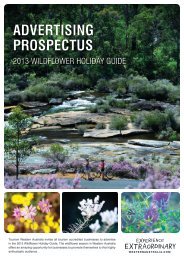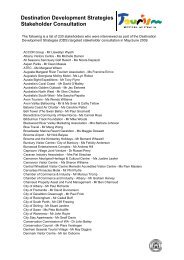A Strategic Approach to the Caravan and Camping Industry 2012
A Strategic Approach to the Caravan and Camping Industry 2012
A Strategic Approach to the Caravan and Camping Industry 2012
Create successful ePaper yourself
Turn your PDF publications into a flip-book with our unique Google optimized e-Paper software.
KEY ISSUES, TRENDS AND IMPACTS<br />
Consumer Issues<br />
The caravan <strong>and</strong> camping <strong>to</strong>urism market is segmented by:<br />
<br />
<br />
<br />
<br />
<br />
<br />
Family groups<br />
Grey Nomads<br />
Backpackers <strong>and</strong> budget travellers<br />
Experiential travellers<br />
Short break <strong>and</strong> weekend holiday makers; <strong>and</strong><br />
Owners of holiday sited caravans on caravan parks<br />
One market segment will often have entirely different needs from ano<strong>the</strong>r, within <strong>the</strong><br />
market sec<strong>to</strong>r. For example, Family groups generally seek full facility caravan parks<br />
with swimming pools <strong>and</strong> recreation activities. Many short break travellers use cabins,<br />
although some may bring <strong>the</strong>ir own caravans, mo<strong>to</strong>rised units or tents. Experiential<br />
travellers may utilise cabins or hire campervans <strong>and</strong> mo<strong>to</strong>rhomes <strong>and</strong> camp at low<br />
cost <strong>and</strong> no cost locations. There are a great number of ways that <strong>to</strong>urists interact<br />
with caravan <strong>and</strong> camping accommodation facilities.<br />
The consideration of consumer feedback <strong>and</strong> usage of caravan <strong>and</strong> camping product<br />
in Western Australia was important <strong>to</strong> enable assessment of <strong>the</strong> overall st<strong>and</strong>ard of<br />
delivery in key <strong>to</strong>urism locations for different types of users.<br />
In order <strong>to</strong> establish priorities for improvement, <strong>and</strong> <strong>to</strong> provide balance <strong>to</strong> <strong>the</strong><br />
extensive consultation with industry, government <strong>and</strong> o<strong>the</strong>r key stakeholders, <strong>the</strong><br />
Study embarked on extensive consumer consultation, which included meetings <strong>and</strong><br />
discussions with <strong>the</strong> CMCA representing over 60,000 members, as well as <strong>the</strong> WA<br />
Association of <strong>Caravan</strong> Clubs with its 5,000 members. Input was also sought from<br />
regular users of caravan <strong>and</strong> camping product <strong>and</strong> reviews of online forums.<br />
Consumers were provided an opportunity <strong>to</strong> have <strong>the</strong>ir views recorded through a<br />
survey, posted on various caravan <strong>and</strong> camping forums <strong>and</strong> social media sites. The<br />
Study also captured caravan park reviews <strong>and</strong> o<strong>the</strong>r <strong>to</strong>pical caravan <strong>and</strong> camping<br />
issues from websites such as Trip Advisor, Explore OZ <strong>and</strong> Badgers Australian <strong>Caravan</strong><br />
Park Reports.<br />
Travellers were invited <strong>to</strong> provide submissions by email <strong>and</strong> online blogs on issues<br />
relating <strong>to</strong> caravan <strong>and</strong> camping in Western Australia. All submissions <strong>to</strong>pics were<br />
categorised <strong>and</strong> <strong>the</strong> feedback has contributed <strong>to</strong> <strong>the</strong> prioritisation in development of<br />
<strong>the</strong> strategic report.<br />
There is a perception amongst interstate <strong>and</strong> international caravan <strong>and</strong> camping<br />
<strong>to</strong>urists is that Western Australia is not “user friendly” <strong>to</strong>wards <strong>the</strong> particular <strong>to</strong>urism<br />
sec<strong>to</strong>r - a view that is widely communicated by <strong>the</strong> recreational vehicle organisation,<br />
CMCA.<br />
A high proportion of recreational vehicle owners, who spend considerable periods<br />
travelling in <strong>the</strong> state for holidays <strong>and</strong> recreation, seek opportunities <strong>to</strong> camp outside<br />
licenced caravan parks <strong>and</strong> are very vocal in <strong>the</strong>ir requests for <strong>the</strong> provision of lowcost<br />
or free camping. They point <strong>to</strong> <strong>the</strong> lack of availability of caravan park sites during<br />
peak seasons at key holiday locations <strong>to</strong> support <strong>the</strong>ir position.<br />
This group of caravan <strong>and</strong> camping travellers spend extended periods on <strong>the</strong> road<br />
utilising both approved <strong>and</strong> unauthorised camping areas outside of licensed caravan<br />
parks as a matter of preference. They also use rest areas for overnight <strong>and</strong> longer<br />
camping stays. There are a growing number of consumers who feel that <strong>the</strong>y have a<br />
right <strong>to</strong> plan <strong>to</strong> camp in rest areas <strong>to</strong> overcome driver fatigue. Many believe <strong>the</strong>y<br />
should be able <strong>to</strong> free camp at pubic locations on <strong>the</strong> basis that <strong>the</strong>ir recreation<br />
vehicle’s self-containment ensures that <strong>the</strong>y “Leave No Trace”.<br />
Generally, CMCA members <strong>and</strong> o<strong>the</strong>r users of self-contained recreational vehicles are<br />
responsible in <strong>the</strong>ir use of public l<strong>and</strong>. Unfortunately, opening up such areas for<br />
uncontrolled camping often leads <strong>to</strong> violation of <strong>the</strong> environment by o<strong>the</strong>r less<br />
responsible campers. 50<br />
The seasonal peak dem<strong>and</strong> for sites at prime <strong>to</strong>urist locations has been exacerbated<br />
by <strong>the</strong> closure of several caravan parks or <strong>the</strong>ir conversion <strong>to</strong> residential lifestyle parks<br />
or alternative uses such as resorts.<br />
O<strong>the</strong>r impacts on consumers include significant issues with bookings <strong>and</strong> availability of<br />
sites within key DEC managed camping grounds. A trial of online bookings has been<br />
set up for a limited number of sites within <strong>the</strong> following locations: Cape Range<br />
National Park (Kurrajong, Pilgramunna, Tulki, Yardie Creek); Lane Poole Reserve<br />
50 Submission <strong>to</strong>: The Economics <strong>and</strong> <strong>Industry</strong> St<strong>and</strong>ing Committee inquiry in<strong>to</strong> <strong>the</strong> Provision, Use <strong>and</strong><br />
Regulation of <strong>Caravan</strong> Parks (<strong>and</strong> Campgrounds) in Western Australia Submission by DEC<br />
A <strong>Strategic</strong> <strong>Approach</strong> <strong>to</strong> <strong>Caravan</strong> <strong>and</strong> <strong>Camping</strong> Tourism in Western Australia Page 40


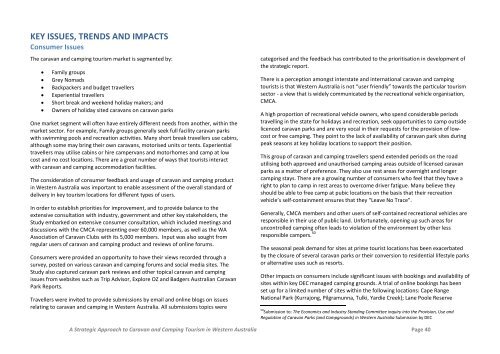
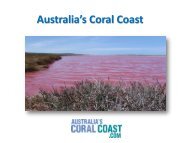
![Annual Report 2002 - 2003 [pdf ] - Tourism Western Australia](https://img.yumpu.com/27124309/1/186x260/annual-report-2002-2003-pdf-tourism-western-australia.jpg?quality=85)
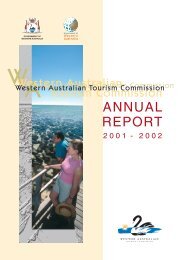
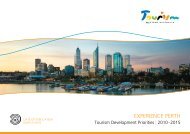
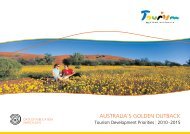
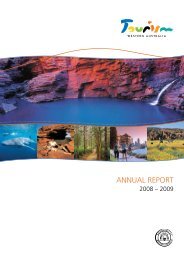

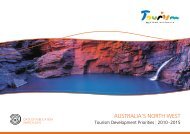
![Our Direction in China 2012 - 2015 [pdf ] - Tourism Western Australia](https://img.yumpu.com/27124271/1/184x260/our-direction-in-china-2012-2015-pdf-tourism-western-australia.jpg?quality=85)
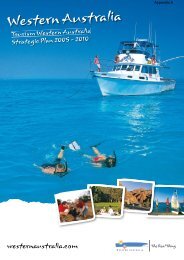
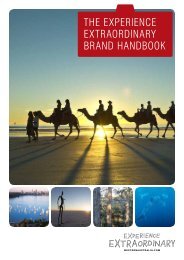
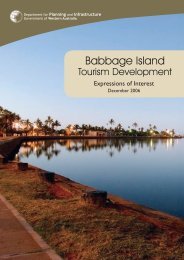
![Naturebank Program 2011 [pdf ] - Tourism Western Australia](https://img.yumpu.com/27124244/1/184x260/naturebank-program-2011-pdf-tourism-western-australia.jpg?quality=85)
